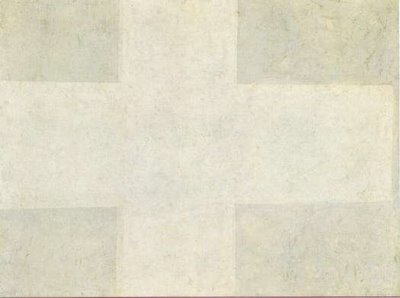
The primary image of Taggart's poetic theogony is that of "the" Cross/crosses. For Taggart, the poet is one who makes crosses on the ground, manifesting eternity in caesura (cf. "Jesus' Blood" in *Crosses*). In crosses/crossing (a (Dickinsonian) law(n) of (the) father(s)) is grace. Taggart makes an effort (such an effort!)--daily, momentarily, incrementally. If he has become overly self-involved I forgive him, where (over-)involvement necessarily loops (back)--proceeding. Onwards!/Backwards!
Crosses are the embodied language marks of movement--movement in place. Olson dances in place while Kierkegaard despairs, becoming in despair. Despair must be a productive force the inverse of joy...
A velocity of moving in place, the motor moving inside the machine of l'Esprit. That we are *all* spiritual automatons. No one.
This is where Kleist comes in.... The sense of falling within the line like the "zips" of a Barnett Newman or his counterpart, Rothko. The mystical *Tsim Tsum* is a crossing in inter-ruption. The sense of being all-knowing (a God) or unknowing (a marionette)(ac-)counts infinitely. In number we are (star-)crossed. Dis-asters.
So this is a discourse of grace and of becoming automatically moved in effort and procedure. I am reminded Robert Bresson chose his actors for their modelesqueness, that they were less like characters than types or ideas to be set into motion--little machines. I like the notion of being set in motion as opposed to being willed or willing one's self. To accomplish such a movement takes discipline and devotion (or habit) primarily, not knowledge, intelligence or wisdom per se.
Reading Alain Badiou's *St. Paul* recently he evokes the figure of the apostle as a limit figure of non-knowledge, that whom circumscribes a discourse game of non-knowledge different than Greek Wisdom (Philosophy/Rhetoric) and Jewish Propheticism (Law, Ethics). The apostle I find comparable to Badiou's dancer in his *Handbook of Inaesthethics*. Giorgio Agamben raises another figure of non-knowldege through his book *The Open*, where at the end of all anthropological projects one discovers a ceasura between the animal and the human wherein un-knowing dwells and issues...
I am interested in these marks of not-knowing as they manifest grace as a form of intention...













No comments:
Post a Comment